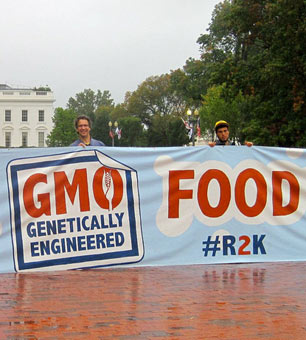Truthout is an indispensable resource for activists, movement leaders and workers everywhere. Please make this work possible with a quick donation.
Truthout combats corporatization by bringing you trustworthy news: click here to join the effort.
Although a ballot initiative to label foods containing genetically modified organisms failed in California, the organizers behind the measure say their movement is better organized and larger than ever before.
Supporters of California’s Proposition 37 are not giving up the fight after Tuesday’s rejection. In fact, they’re saying that the organizing around the initiative helped forge a diffuse group of individuals interested in healthy food into a powerful, organized movement.
“The Organic Consumers Association is a million strong,” said Ronnie Cummins, the founder and director of that group said on a conference call on November 7. “We have 5 million people on our email list and we’re looking forward to continuing this battle.”
Proposition 37 would have required the labeling of foods that contain genetically modified organisms (GMOs) and banned the use of the word “natural” to market products that contain GMOs. While the initiative won urban coastal counties such as Los Angeles and San Francisco, it lost in the state’s central valleys.
“We just didn’t have the funds to compete on the air” in those regions, said Stacy Malkan, media director at California Right to Know. “Many of those voters were getting their news from TV and we couldn’t compete with them.”
Companies like Monsanto, DuPont, and Pepsi poured nearly $50 million dollars into opposing the measure—about seven times what its supporters were able to raise—and spent most of the money on television and radio ads.
Throughout the campaign, the truthfulness of advertisements opposing the measure came into question. At one point, the No on 37 campaign ran an ad that identified Henry I. Miller, an opponent of the measure, as a professor at Stanford University. The campaign was forced to pull the ad after Stanford announced that Dr. Miller was not a professor there.
Multiple strategies going forward
Despite these frustrations, the mood was bright on Wednesday among supporters of Proposition 37, who were already discussing plans to introduce a similar ballot initiative in Washington state in 2013. Such an measure would need 325,000 signatures in order to significantly exceed the requirements for inclusion on the ballot, and organizers on the ground have already gathered half of that, according to Cummins.
Activists are making preparations for a similar effort in Oregon, although signature gathering there has yet to go into full force. Meanwhile, GMO-labeling bills have been introduced in the state legislatures of Connecticut and Vermont, which do not have a ballot initiative process.
Alongside efforts to implement GMO labeling in individual states, the food movement is putting pressure on the federal government. Dave Murphy, co-chair of the Yes on 37 campaign, explained that the U.S. Food and Drug Administration ruled in 1992 that GMO crops are “equivalent” to traditional crops and therefore did not require labeling.
“We believe that there is evidence that GMO crops are not equivalent and now is the time for the FDA to review that policy,” Murphy said. He added that the “Just Label It” campaign had collected more than one million signatures on a petition asking the FDA for a review and that the Center for Food Safety has said it is prepared to sue if the administration fails to respond.
Another achievement of the Yes on 37 campaign was the education of consumers, Cummins said. People had previously thought that products marketed as “natural” were “almost organic but cheaper.”
The Yes on 37 campaign opened the conversation and changed that, he said. “‘Natural’ is a marketing term and has nothing to do with health or environmental sustainability.”
Holding Trump accountable for his illegal war on Iran
The devastating American and Israeli attacks have killed hundreds of Iranians, and the death toll continues to rise.
As independent media, what we do next matters a lot. It’s up to us to report the truth, demand accountability, and reckon with the consequences of U.S. militarism at this cataclysmic historical moment.
Trump may be an authoritarian, but he is not entirely invulnerable, nor are the elected officials who have given him pass after pass. We cannot let him believe for a second longer that he can get away with something this wildly illegal or recklessly dangerous without accountability.
We ask for your support as we carry out our media resistance to unchecked militarism. Please make a tax-deductible one-time or monthly donation to Truthout.
